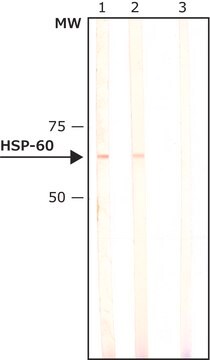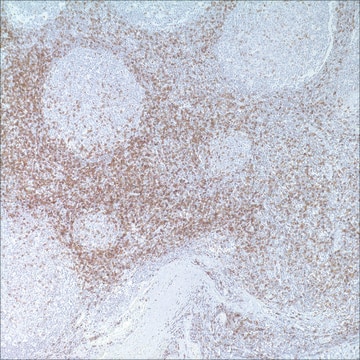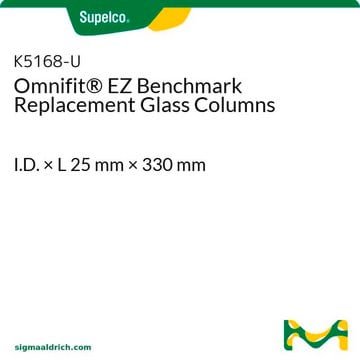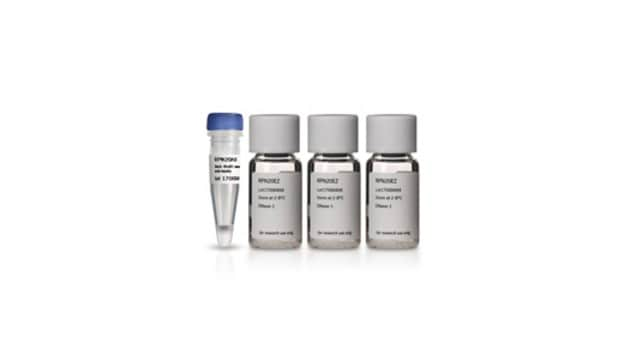推荐产品
生物源
mouse
品質等級
抗體表格
purified antibody
抗體產品種類
primary antibodies
無性繁殖
B1-3C5, monoclonal
物種活性
human
製造商/商標名
Chemicon®
技術
flow cytometry: suitable
immunofluorescence: suitable
同型
IgG1
NCBI登錄號
UniProt登錄號
運輸包裝
wet ice
目標翻譯後修改
unmodified
基因資訊
human ... CD34(947)
特異性
This antibody belongs to CD34 (assigned by the Third International Workshop on Leukocyte Differentiation Antigens, Oxford, 1987; Hogg & Horton, 1987). It reacts with a 120kD glycoprotein found on progenitor cell populations in human bone marrow and foetal liver (Katz et al., 1985). This antigen is normally restricted to immature human haemopoietic precursor cells (Peschel & Koller, 1989).
Cell reactivity (Tindle et al., 1985):
Normal: No reaction with normal peripheral lymphocytes, granulocytes, monocytes, erythrocytes and platelets. Reacts with <4% of cells in normal bone marrow.
Clinical: Reaction
Acute myeloid leukemia (AML, M1 and M2) positive
Null lymphoblastic leukemia (Null ALL) positive
Common acute lymphoblastic leukemia (CALL) positive
Myeloblastic and lymphoblastic crises of chronic
granulocytic leukemia (CGL) positive
Chronic myeloid leukemia (CML) negative
T cell acute lymphoblastic leukemia (TALL) negative
B cell acute lymphoblastic leukemia (BALL) negative
Chronic lymphocytic leukemia (CLL) negative
Cell lines:
Reacts with early myeloblast line KG1. No reaction with null, B or T lymphoid, erythroid or later myeloid cell lines.
Cell reactivity (Tindle et al., 1985):
Normal: No reaction with normal peripheral lymphocytes, granulocytes, monocytes, erythrocytes and platelets. Reacts with <4% of cells in normal bone marrow.
Clinical: Reaction
Acute myeloid leukemia (AML, M1 and M2) positive
Null lymphoblastic leukemia (Null ALL) positive
Common acute lymphoblastic leukemia (CALL) positive
Myeloblastic and lymphoblastic crises of chronic
granulocytic leukemia (CGL) positive
Chronic myeloid leukemia (CML) negative
T cell acute lymphoblastic leukemia (TALL) negative
B cell acute lymphoblastic leukemia (BALL) negative
Chronic lymphocytic leukemia (CLL) negative
Cell lines:
Reacts with early myeloblast line KG1. No reaction with null, B or T lymphoid, erythroid or later myeloid cell lines.
免疫原
KG1 human acute myelogenous cell line.
應用
Detect CD34 Class I using this Anti-CD34 Antibody (Class 1), clone B1-3C5 validated for use in FC & IF.
Identification of CD34 positive cells is important for the diagnosis and classification of acute myeloid leukemia (AML). It is especially useful in patients with poorly differentiated myeloblasts, as well as in myeloblastic crises of chronic granulocytic leukemia. It has been recommended that this antibody be used as part of a panel for screening of leukemia (Batinic et al., 1989).
SUGGESTED USAGE DILUTION
1. Flow cytometry and indirect immunofluorescence 1:25
Dilute with isotonic buffer. Use 50 μl of diluted antibody per 1 x 10E6 peripheral blood mononuclear cells (PBMC) or bone marrow cells in 100 μl of buffer.
2. Indirect immunoperoxidase staining - the final dilution will depend on the assay conditions and detection system employed. However, a dilution of at least 1:25 will be applicable to most commonly used systems.
SUGGESTED USAGE DILUTION
1. Flow cytometry and indirect immunofluorescence 1:25
Dilute with isotonic buffer. Use 50 μl of diluted antibody per 1 x 10E6 peripheral blood mononuclear cells (PBMC) or bone marrow cells in 100 μl of buffer.
2. Indirect immunoperoxidase staining - the final dilution will depend on the assay conditions and detection system employed. However, a dilution of at least 1:25 will be applicable to most commonly used systems.
Research Category
Cell Structure
Cell Structure
Research Sub Category
ECM Proteins
ECM Proteins
外觀
Format: Purified
The antibody is supplied in phosphate buffered saline, pH 7.4, containing 0.2% bovine serum albumin and 0.1% sodium azide. The characteristics of each lot are tested by electrophoresis and flow cytometry.
儲存和穩定性
For prolonged periods, store below -20°C in undiluted aliquots. AVOID REPEATED FREEZE/THAW CYCLES. Product stable for 6 months when stored as directed.
WARNING: The monoclonal reagent solution contains 0.1% sodium azide as a preservative. Due to potential hazards arising from the build up of this material in pipes, spent reagent should be disposed of with liberal volumes of water.
WARNING: The monoclonal reagent solution contains 0.1% sodium azide as a preservative. Due to potential hazards arising from the build up of this material in pipes, spent reagent should be disposed of with liberal volumes of water.
法律資訊
CHEMICON is a registered trademark of Merck KGaA, Darmstadt, Germany
免責聲明
Unless otherwise stated in our catalog or other company documentation accompanying the product(s), our products are intended for research use only and are not to be used for any other purpose, which includes but is not limited to, unauthorized commercial uses, in vitro diagnostic uses, ex vivo or in vivo therapeutic uses or any type of consumption or application to humans or animals.
未找到合适的产品?
试试我们的产品选型工具.
儲存類別代碼
12 - Non Combustible Liquids
水污染物質分類(WGK)
WGK 2
Hyo-Young Park et al.
Molecular reproduction and development, 80(12), 1035-1047 (2013-10-24)
Human adipose tissue-derived mesenchymal stem cells (hAT-MSCs) secrete bioactive materials that are beneficial for tissue repair and regeneration. In this study, we characterized human hAT-MSC bioactive material (hAT-MSC-BM), and examined the effect of hAT-MSC-BM on porcine embryo development. hAT-MSC-BM was
Yongjie Wei et al.
Cell, 168(1-2), 224-238 (2016-12-27)
The removal of unwanted or damaged mitochondria by autophagy, a process called mitophagy, is essential for key events in development, cellular homeostasis, tumor suppression, and prevention of neurodegeneration and aging. However, the precise mechanisms of mitophagy remain uncertain. Here, we identify
Giulia Detela et al.
Biotechnology journal, 13(2) (2018-01-16)
Human mesenchymal stromal cells (hMSCs) are excellent candidates for cell therapy but their expansion to desired clinical quantities can be compromised by ex vivo processing, due to differences between donor material and process variation. The aim of this article is
In-Su Park et al.
PloS one, 10(6), e0122776-e0122776 (2015-06-13)
We investigated whether low-level light irradiation prior to transplantation of adipose-derived stromal cell (ASC) spheroids in an animal skin wound model stimulated angiogenesis and tissue regeneration to improve functional recovery of skin tissue. The spheroid, composed of hASCs, was irradiated
我们的科学家团队拥有各种研究领域经验,包括生命科学、材料科学、化学合成、色谱、分析及许多其他领域.
联系技术服务部门








